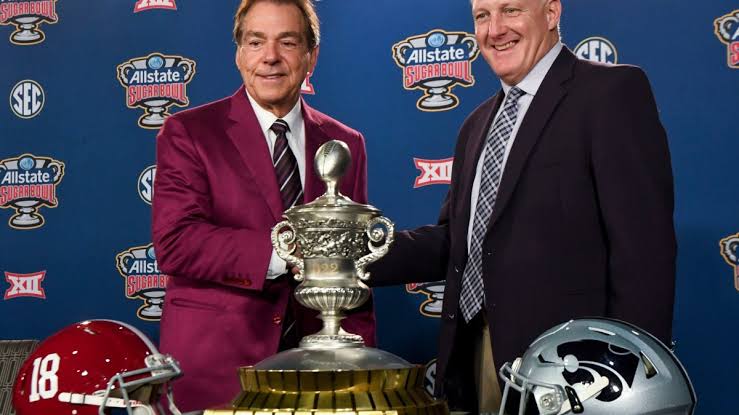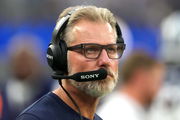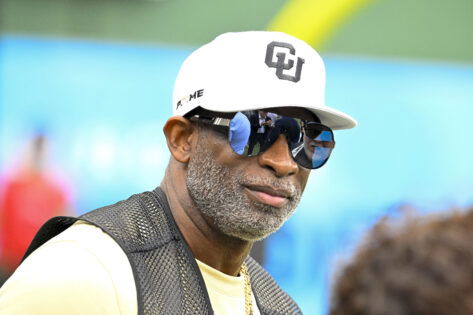

Ever wondered how college football coaches turn modest salaries into million-dollar empires? It’s not just about the game on the field. With base salaries often under $500,000, these coaches have found other ways to cash in big through perfectly crafted contracts.
Watch What’s Trending Now!
Behind many of these deals are savvy agents who know how to play the game just as well as the coaches they represent. “Academic institutions are run by a President who I wouldn’t call Jeff Bezos or Steve Jobs when it comes to doing deals“, states John Middlekauff, former NFL scout, “They get f**king dominated by agents who represent the coaches“. However, that is not all. Sometimes the coaches themselves manage to market themselves to extreme heights of monetary success. Here’s a breakdown of how they do exactly that.
ADVERTISEMENT
The role of agents in coaching contracts
One of the main ways college football coaches get real financial gains from their contracts is through negotiating huge bonuses and endorsement deals. Even though the base salaries of these coaches can range from $500,000 to $1.2 million. People like Jimmy Sexton will ensure that their clients will get lucrative bonuses and endorsements that will increase their total compensation to between $1 million and $8 million annually. As John Middlekauff explained on his show 3 and Out, the imbalance in negotiation skills between experienced agents and university presidents or athletic directors mostly leads to coaches getting very lopsided contracts.

Imago
NCAA, College League, USA Football: Alabama press conference, PK, Pressekonferenz Head Coach Kalen DeBoer Introduction Jan 13, 2024 Tuscaloosa, AL, USA University of Alabama former head coach Nick Saban attends a press conference to introduce the new head football coach Kalen DeBoer not pictured in the North end zone at Bryant-Denny Stadium. Tuscaloosa Bryant-Denny Stadium AL USA, EDITORIAL USE ONLY PUBLICATIONxINxGERxSUIxAUTxONLY Copyright: xJohnxDavidxMercerx 20240113_jcd_sx1_0040
Jimmy Sexton is the king of college football negotiations, having made his customer base of the best coaches in the business. His strategic moves and close ties give him a distinctive advantage. He has broken the norms by setting new standards for coaching contracts.
ADVERTISEMENT
For instance, the contract extension between Nick Saban and Alabama, managed by him, is eight years long and worth $93.6 million and this deal runs through 2029. Saban’s base pay of $305,000 a year pales compared to the $6.2 million he makes through talent fees. Take, for instance, in 2022, his talent fee was $9.595 million and increased annually to $12.395 million by 2029. Furthermore, Saban gets $800,000 for every season completion from 2022 to 2025 and $100,000 yearly for his charity, Nick’s Kids.
Top Stories
Cowboys Fire Defensive Coordinator Matt Eberflus: Contract, Salary, NFL Earnings & More

Ross Chastain Labels NASCAR Driver “The Most Punchable Face” to Excuse Himself Over Punchgate Controversy

10 Biggest NFL Draft Busts of the Last Decade, Including Trey Lance and Justin Fields

Andy Reid Sets Record Straight on Travis Kelce’s Chiefs Future As Retirement Question Continue to Mount

Commissioner Steve Phelps Quits NASCAR Days After Getting Exposed in Lawsuit Trial

Arman Tsarukyan Back in Play as Justin Gaethje Staph Infection Rumors Causes Fan Panic Before Paddy Pimblett Fight

Another example of Sexton’s master skills is Kirby Smart’s contract, which he secured effectively. Smart’s 10-year contract, worth more than $112 million and signed in 2022, makes him one of the top-paid coaches in college football. Smart’s pay also escalates throughout the contract to a staggering $12.25 million by the last year. His contract includes substantial bonuses for SEC and national championships, highlighting Sexton’s strategic approach to tying earnings to success metrics.
ADVERTISEMENT
Self-made marketing genius in college football
Deion Sanders, who is also known as “Prime Time,” turned a career barrier into a marketing victory. As Colorado State’s coach Jay Norvell criticized Sanders‘ signature style, Sanders made the most of the situation and responded. He spearheaded a customized sunglasses line with Blenders Eyewear. This smart move, in turn, turned an apparent insult into a profitable deal. He earned $4.8 million in pre-sales. Sanders‘ capacity to turn issues into a brand asset demonstrates his marketing skills. He turns obstacles into profitable opportunities with no effort.

USA Today via Reuters
Mar 30, 2024; Arlington, TX, USA; Colorado Buffaloes football head coach Deion Sanders before the game between the Arlington Renegades and the Birmingham Stallions at Choctaw Stadium. Mandatory Credit: Jerome Miron-USA TODAY Sports
In a broader context, Sanders‘ way of financial success is the strategic placement and branding. His sports career has yielded earnings from several sports and also includes lucrative endorsements. Transitioning into coaching, Sanders brought his personality to the University of Colorado. He considerably escalated the program’s visibility and profitability. His impact radiates out to his players, primarily his sons, who bagged considerable NIL contracts. Sanders never ceases to evolve he does so by leveraging his public image.
ADVERTISEMENT
It is not only the salaries that make the coaches wealthy but also bonuses, endorsements, and well-structured contracts. Jimmy Sexton and his likes are the ones who make sure these coaches get the fat contracts that go beyond the university deals, thereby opening up the financial domain. However, sometimes it’s the coaches themselves who rack up millions by being attentive and leveraging their style.
ADVERTISEMENT
ADVERTISEMENT
ADVERTISEMENT

